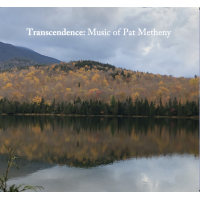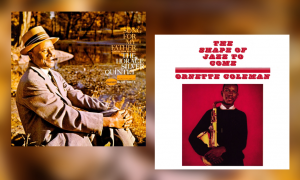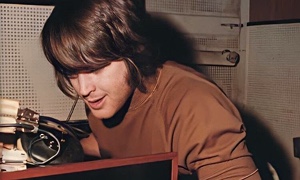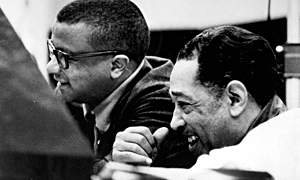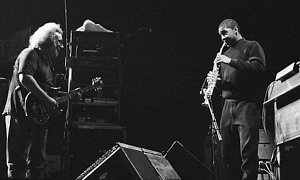Home » Jazz Articles » Building a Jazz Library » Derek Bailey
Derek Bailey
Derek Bailey
guitar1932 - 2005

Tony Oxley
drums1938 - 2023

Trevor Watts
saxophoneb.1939
John Stevens
drumsb.1940

Paul Rutherford
tromboneb.1940

Evan Parker
saxophone, sopranob.1944

Barry Guy
bass, acousticb.1947
Bailey was also a great talker, always ready to offer his views on any subject, especially music. His 1980 book Improvisation: Its Nature and Practice in Music (Moorland Publishing, 1980? Da Capo, 1993) and the television series that resulted from it have both come to be regarded as classics, essential points of reference for anyone interested in improv. Having worked as a professional session musician and in dance-hall bands before turning to free improvisation, Bailey was always immune to the jibes of the uninformed that free improvisers could not play "properly" (i.e. time & changes etc.)? he had already been there, done that and got the tee-shirt!
Bailey's vast discography contains many great albums? all those recommended below are excellent but there are many more just as good. In the Building a Jazz Library entry on Free Improvisation, three of the twelve recommendations featured Bailey—Karyobin (Island, 1968) by Spontaneous Music Ensemble (SME), The Baptised Traveller (Columbia, 1969) by the Tony Oxley Quintet and Once (Incus, 1989) by Company. To avoid duplication, they are not repeated here but those below are additional to them. Together, these selections cover a representative range of styles and formats from the years Bailey was active as a free improviser, between the mid-60's and his death on Christmas Day 2005.
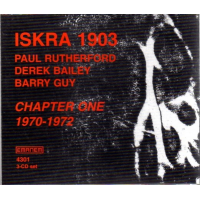 Iskra 1903 Chapter One 1970-1972 (Emanem, 2000)
Iskra 1903 Chapter One 1970-1972 (Emanem, 2000) Formed in 1970 by trombone legend Paul Rutherford, Iskra 1903 (Iskra being the Russian name of Lenin's pre-revolution newspaper, The Spark) initially consisted of Rutherford, Bailey and bassist Barry Guy. The absence of a drummer helped give the music a sense of lightness and freedom. While Rutherford was often the leading light, guitar and bass interweaved with his trombone to create a rich tapestry of sound. Bailey left the group in 1974 (to be replaced some years later by violinist Philipp Wachsmann). Iskra 1903 is significant as it is considered to be the last long-term fixed-personnel group that Bailey worked in.
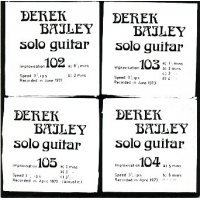 Incus Taps (Cortical Foundation, 1996)
Incus Taps (Cortical Foundation, 1996) "I think playing solo is a second rate activity, really. For me, playing is about playing with other people. In the absence of that, I am happy to play solo, but I don't think there is any comparison."
Despite that Bailey quote from a September 2001 interview, no selection of his work should exclude his solo guitar playing. Although most of his other solo recordings are recommended, Incus Taps ticks all the boxes. Originally recorded at home in April and June 1973 and released on four (now impossible to acquire) reel-to-reel tapes, they were later compiled and released on vinyl. (Of course, the "Incus" in the album title refers to the independent record label that Bailey had set up in 1970 with drummer Tony Oxley and saxophonist Evan Parker.) The album's eleven tracks, ranging in length from one-and-a-half to eight-and-a-half minutes, were considered iconoclastic at the time but, with every passing year, they sound increasingly prophetic and influential. The YouTube clip below is a later example of Bailey playing solo and chatting informally in a live context:
 Company 6 & 7 (Incus, 1992)
Company 6 & 7 (Incus, 1992) "For me, Company is still the best way for me to work. It has always meant that, 'in company' as opposed to solo, just with other people, really. The only thing I could say about Company is that it is not solo." DB, 2001
1976 was a watershed year for Bailey, as it saw the first series of concerts by a group of musicians from Britain, Europe and USA convened under the collective banner Company, including Bailey, Evan Parker, cellist

Tristan Honsinger
cellob.1949

Han Bennink
drumsb.1942

Steve Lacy
saxophone, soprano1934 - 2004

Anthony Braxton
woodwindsb.1945
1977 saw the first Company Week, when the concerts were held over consecutive days, with the above seven musicians plus

Steve Beresford
piano
Lol Coxhill
saxophone, sopranob.1932

Leo Smith
b.1941Altogether, some eighteen Company albums have been released. Some day they deserve to be brought together as a box set. Until that day arrives, all should be considered essential listening.
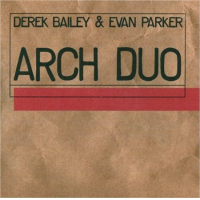 Derek Bailey & Evan Parker Arch Duo (Rastacan, 1999)
Derek Bailey & Evan Parker Arch Duo (Rastacan, 1999) As with the solo and Company discs above, it is impossible not to include a Bailey-Parker duo recording here. Right from the mid-sixties when they played together in SME and at London's cradle of improv, the Little Theatre Club, the two were closely associated, particularly after the formation of Incus and then Company. They recorded together in many different groupings including several duo albums.
Sadly, a rift developed between Bailey and Parker, and in 1985 they separated with Parker leaving Incus, which Bailey continued to run alone. The reasons for the rift have never been fully explained, but a source close to Bailey has opined that they were like brothers who had grown apart; maybe the fourteen-year age between them played a part—at the time of the split Bailey was in his mid-fifties, Parker in his early-forties.
Anyway, Arch Duo is fascinating as it was recorded five years prior to the separation; it captures the pair in top form as they manage to combine their distinctive voices together amicably. Not so easy to watch is this YouTube clip from 1985, in which the pair hardly seem to be on speaking terms:
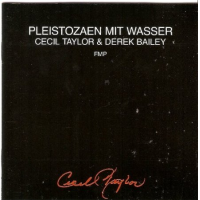 Cecil Taylor & Derek Bailey Pleistozaen Mit Wasser (FMP, 1989)
Cecil Taylor & Derek Bailey Pleistozaen Mit Wasser (FMP, 1989) Although not playing together, Bailey and Parker were separately present in Berlin in summer 1988 for

Cecil Taylor
piano1929 - 2018
Lest these selections become too centred on Europe and USA, let's not overlook Bailey's links with performers from across the world, especially Asia, as exemplified by this clip from Bailey's 1993 duo with Japanese dancer Min Tanaka which was the subject of the Incus video Mountain Stage:
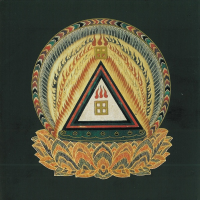 Arcana The Last Wave (DIW, 1996)
Arcana The Last Wave (DIW, 1996) As Company matured, Bailey became increasingly diverse in the musicians he invited to it, often making for a very eclectic mix of musicians. Despite that, seasoned Bailey watchers were somewhat surprised by some of the recordings he made from the late-nineties onwards, seeming to wilfully be going way beyond the "normal" boundaries of improv. The Last Wave by the trio Arcana with

Bill Laswell
bassb.1955

Tony Williams
drums1945 - 1997

Pat Metheny
guitarb.1954

Jamaaladeen Tacuma
bassb.1956

Calvin Weston
drumsb.1959
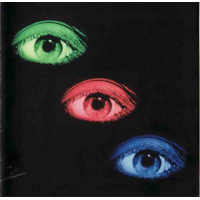 Trio Playing (Incus, 1997)
Trio Playing (Incus, 1997) After the above recordings with overseas players, Trio Playing provides a welcome reminder that Bailey spent much of his time in London, playing with London-based musicians or welcoming overseas players who visited to play with him at home. The trio in question combines Bailey with two of London's finest, saxophonist

John Butcher
saxophoneb.1954

Oren Marshall
tuba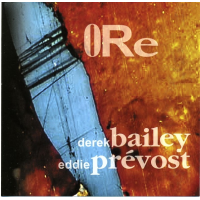 Derek Bailey &
Derek Bailey & 
Eddie Prevost
drumsb.1942
This 2000 duo brought together two of improv's founding fathers who, in the 60's, were in groups that were considered to adopt contrasting approaches to improv—the "atomistic" approach of SME and the "laminar" approach of AMM. Be that as it may, Bailey and Pr®¶vost prove to be accommodating to one another and entirely compatible, the end result being some of the best duo playing of their careers. Essential.
 Ballads (Tzadik, 2002)
Ballads (Tzadik, 2002) Another surprise! If the atypical mid-nineties series of albums had pulled the rug out from under some Bailey followers, at the start of the new millennium he released two solo guitar albums—both suggested by

John Zorn
saxophone, altob.1953
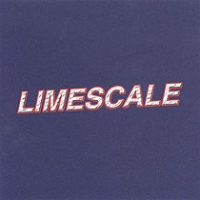 Limescale Limescale (Incus, 2003)
Limescale Limescale (Incus, 2003) Finally, another Incus release that is as gritty as its title suggests. Limescale combines Bailey and two of his perennial favourites—clarinetist

Alex Ward
multi-instrumentalistb.1974
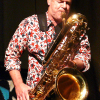 "
data-original-title="" title="">Tony Bevan—with two lesser-known noise improvisers—T.H.F. Drenching on Dictaphone and Sonic Pleasure on bricks. The quintet produces music that bursts with sound, energy and ideas, led from the front by Bailey. Improv at its best—a fitting place to end.
"
data-original-title="" title="">Tony Bevan—with two lesser-known noise improvisers—T.H.F. Drenching on Dictaphone and Sonic Pleasure on bricks. The quintet produces music that bursts with sound, energy and ideas, led from the front by Bailey. Improv at its best—a fitting place to end.
Tags
Building a Jazz Library
Derek Bailey
John Eyles
Tony Oxley
Trevor Watts
John Stevens
Paul Rutherford
evan parker
barry guy
Tristan Honsinger
Han Bennink
Steve Lacy
anthony braxton
Steve Beresford
Lol Coxhill
Leo Smith
Cecil Taylor
Bill Laswell
Tony Williams
Pat Metheny
Jamaaladeen Tacuma
Calvin Weston
John Butcher
Oren Marshall
Eddie Prevost
john zorn
Alex Ward
Tony Bevan
Comments
PREVIOUS / NEXT
Support All About Jazz
 All About Jazz has been a pillar of jazz since 1995, championing it as an art form and, more importantly, supporting the musicians who make it. Our enduring commitment has made "AAJ" one of the most culturally important websites of its kind, read by hundreds of thousands of fans, musicians and industry figures every month.
All About Jazz has been a pillar of jazz since 1995, championing it as an art form and, more importantly, supporting the musicians who make it. Our enduring commitment has made "AAJ" one of the most culturally important websites of its kind, read by hundreds of thousands of fans, musicians and industry figures every month.






 Buy Now
Buy Now



